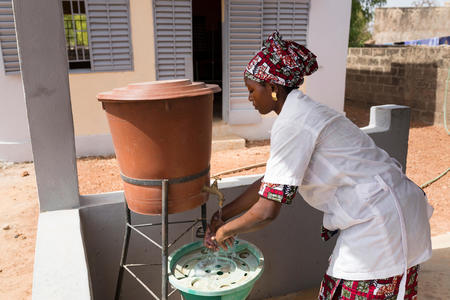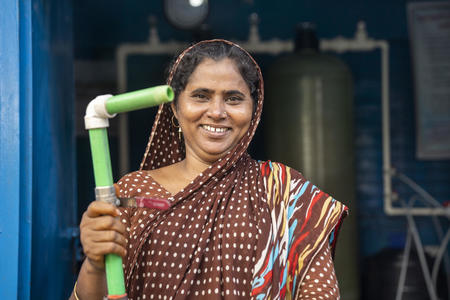Towards a joint action agenda on women’s rights to water and sanitation

Ahead of the 25th anniversary of the Beijing Platform for Action on women's rights, WaterAid's Katie Tobin and ActionAid's Baishali Chatterjee look at the huge gender inequalities that still exist in access to water, sanitation and hygiene, launching our joint e-consultation to chart a path forward for advocacy and programming.
Take part in the e-consultation in English, French, Portuguese or Spanish (no longer active).
Access to water and sanitation are fundamental human rights and crucial to achieving gender equality. 25 years ago, the Beijing Platform for Action (BPfA) – the foundational global agreement on women’s rights – called on all governments to ‘ensure the availability of and universal access to safe drinking water and sanitation and put in place effective public distribution systems as soon as possible.’
Huge inequalities in access to water and sanitation
As the international community observes the 25th anniversary of the BPfA – and the tenth anniversary of the UN General Assembly's recognition of water and sanitation as human rights – this goal remains frustratingly out of reach. The most recent data by the WHO/UNICEF Joint Monitoring Programme show an estimated 785 million people worldwide still lack basic water services and 2 billion lack basic sanitation.
These massive inequalities in access contribute significantly to the gendered burden of unpaid care work. Women and girls are responsible for water collection in 80% of households without access to water on premises, according to data from 61 developing countries. A study of time and water poverty in 25 Sub-Saharan African countries estimated that women spend at least 16 million hours a day collecting drinking water, while men spend 6 million hours, and children 4 million hours on the task.
Beyond their household work burdens, women and girls also face specific challenges caused by insufficient water, sanitation and hygiene (WASH) in schools and healthcare facilities – disrupting their educations, preventing them from accessing sexual and reproductive health services, and impacting on their livelihoods as frontline health workers.
COVID-19 exacerbates inequalities in WASH access
The outbreak of the COVID-19 pandemic makes these inequalities in access to WASH even more visible, as women and girls take on increased responsibilities for water collection in constrained and dangerous circumstances. Handwashing with soap is touted as one of the primary prevention measures to avoid the spread of the virus, but 3 billion people don’t have handwashing facilities with water and soap at home.
Increased demand for water at household level means that women and girls must queue for water more often and for longer periods of time, often unable to practise recommended physical distancing measures while doing so. For women and girls living in poverty, informal settlements, and other situations of exclusion and discrimination, protecting themselves and their households from COVID-19 remains a distant dream.
Gendered impacts of COVID-19 and insufficient access to WASH are worsened by the climate crisis, which is projected to significantly increase water scarcity and stress. More than 30 years of privatisation of water supply has limited provision of services, especially in rural areas where companies struggle to make a profit (as the costs to establish systems are too high and people are too poor to pay).
Re-examining the BPfA requires reiterating the importance of access to WASH in fulfilling the rights of women and girls – even more urgent in the context of widespread privatisation, the impacts of climate change and the global COVID-19 pandemic.
Towards a joint action agenda on WASH and gender: opening a global e-consultation
Water and sanitation are essential public services that should meet the needs and priorities of all groups of people regardless of gender, age, ability or health status, ethnicity, religion, sexual orientation and gender identity, caste, income or class or social context – while taking into account the intersections between these determinants of access. Quality, gender-responsive public services provide an important route to better lives for women living in poverty and for their communities. As the COVID-19 pandemic has made clear, gender-responsive water and sanitation services are required to decrease women’s and girls’ burden of unpaid care and domestic work and ensure all women and girls can enjoy their rights to health, education, economic security, political and civic participation and leisure.
To develop a nuanced analysis and chart a path forward for collective advocacy on WASH and gender as part of this foundational year of discussion and action, ActionAid and WaterAid are launching an e-consultation. Emerging from our initial plans to hold a joint strategy meeting as a side event to the 64th Commission on the Status of Women (CSW64), this online discussion will target gender and WASH practitioners, grassroots organisations, NGOs, women’s rights groups, trade unions, academics, United Nations staff and broader networks working on water rights, environmental justice and access to public services from a feminist perspective.
Identifying areas for advocacy and programming
Through this online forum, we hope to connect activists and thinkers across sectors, to foreground the commitments made by national governments in the BPfA, SDG6 and various international resolutions and strategise towards key actions and collaboration to make gender-responsive water and sanitation services a reality. The e-consultation will identify areas for further advocacy and programming around WASH, gender, poverty, public services, climate change and equitable COVID-19 recovery, as part of global efforts towards achieving gender equality and reaching the SDGs. Building on relevant analysis, including a recent e-discussion on WASH and gender organised by the Rural Water Supply Network (RWSN), the e-consultation aims to garner concrete, actionable recommendations that connect policy to practice.
Guiding questions
Please note, this consultation is now closed.
- What are some examples of how women’s and girls’ rights can be fulfilled through universal access to quality, gender-responsive water, sanitation and hygiene services, particularly with reference to reducing and redistributing gendered burdens of unpaid care work?
- What changes need to happen to policy, programming and budget investment at national level to improve access to safe water, sanitation and hygiene for women and girls?
- What is the role of international actors, including international financial institutions, in ensuring the rights to water and sanitation?
- How can COVID-19 response and recovery be geared towards increasing access to water, sanitation and hygiene especially for women and girls?
- How should women’s and girls’ access to WASH be protected in the face of an increasing climate crisis?
- What should the 25-year review of the Beijing Platform for Action prioritise in terms of women’s and girls’ rights to water and sanitation? Specific language suggestions welcome.
- What actions can civil society and allies take leading up to the Generation Equality Forum and CSW65 to link water, sanitation and hygiene and women’s and girls’ rights?
The e-consultation is now closed – read the policy brief.
Upon its conclusion, ActionAid and WaterAid produced a policy brief analysing the discussion, targeting the official Beijing+25 review during the 75th UN General Assembly and the Generation Equality Forum in 2021.
Further reading and sources
ActionAid (2019): Gender Responsive Public Services and Macro Economic Policy in Ghana
ActionAid (2020): Who cares for the future: finance gender responsive public services
Australian Water Partnership (2017): Gender Equality and Goal 6: The Critical Connection
Gender and Development Network (2016): Achieving Gender Equality Through WASH
Oxfam (2020): Achieving Sustainable Development Goals 5 and 6: The case for gender-transformative water programmes
Rural Water Supply Network (2017): Gender and rural water services – lessons from RWSN members (blog)
UNICEF and WHO (2019): Progress on household drinking water, sanitation and hygiene 2000-2017: Special focus on inequalities
UN Women (2019): Progress on the Sustainable Development Goals: The gender snapshot 2019
WaterAid (2017): Water, sanitation and hygiene: a pathway to realising gender equality and the empowerment of women and girls (PDF)
WaterAid, International Planned Parenthood Federation (IPPF), International Women’s Health Coalition (IWHC), Marie Stopes International (MSI), and Simavi (2019): A shared agenda: exploring links between water, sanitation, hygiene, and sexual and reproductive health and rights in sustainable development
White Ribbon Alliance (2019): What Women Want: Demands for Quality Reproductive and Maternal Healthcare from Women and Girls (PDF)
WSSCC and WaterAid (2013): We Can’t Wait: A report on sanitation and hygiene for women and girls
World Bank (2020): Water fetching responsibilities reveal unequal gender dynamics: Elevates need for expansion of on-site WASH facilities (blog)
Katie Tobin is Advocacy Adviser at WaterAid and Baishali Chatterjee is International Project Manager at ActionAid.






